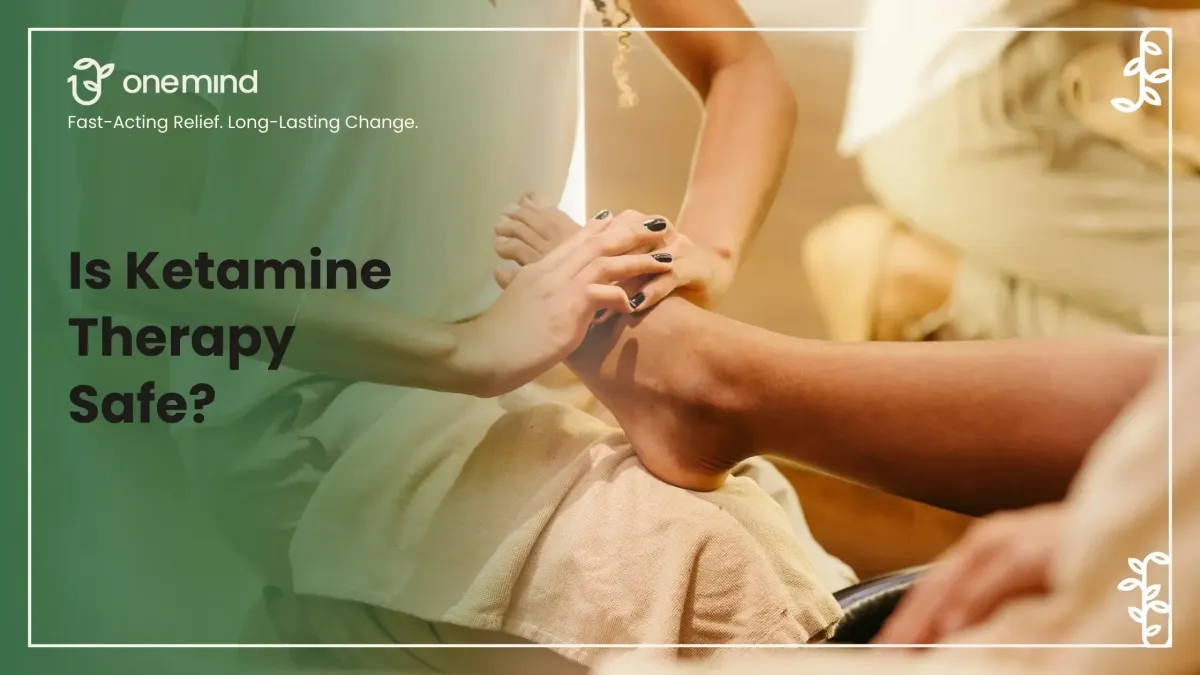Your Space
Transparent Healing.
When therapy, meds, and mindfulness aren’t enough, we help you break through—fast, safe, proven.
Blog

Is Ketamine Therapy Safe? Facts About Ketamine Clinic Use
More people are asking: Is ketamine therapy safe? Maybe you’re reading about it after seeing headlines about actor Matthew Perry’s death. That can be scary. At the same time, you hear stories of real help for people with deep depression or pain.
And you wonder, is it worth the risk? Here’s a clear, warm, and honest guide. We’ll walk through how ketamine works. We’ll be very open about risks and benefits. We’ll talk about what makes a clinic trustworthy.
Is Ketamine Therapy Safe? Facts About Ketamine Clinic Use
What Is Ketamine and Why Is It Being Used in Mental Health?
How Does Ketamine Treatment Work in a Medical Setting?
FDA Approval and Medical Legitimacy
Which candidates Are Best For Ketamine Therapy?
What Does Ketamine Feel Like During and After Treatment?
Pros and Cons of Ketamine Therapy
What Are the Real Risks? Let’s Be Honest
Can You Do At‑Home Ketamine Therapy?
Is Ketamine Therapy Safe Overall?
What Is The Safest Way To Try Ketamine Therapy?
Is Ketamine Therapy Addictive?
Who Should Not Try Ketamine Therapy?
What Is Ketamine and Why Is It Being Used in Mental Health?
Ketamine is gaining attention in mental health care for its fast-acting results. Though it began as a surgical anesthetic, doctors now see new hope in its ability to treat serious mood disorders.
Originally used as an anesthetic – Ketamine was first used to safely put patients to sleep during surgery.
Acts fast on the brain – At low doses, it calms a brain in distress much quicker than traditional antidepressants.
Helps when other treatments fail – Many patients turn to ketamine therapy after other medications stop working.
Used for serious mental health issues – It’s now used to treat depression, PTSD, anxiety, and other psychiatric conditions.
Backed by medical research – Studies from top hospitals and universities support its growing role in therapy.
Different from opioids – Though powerful, it is not the same as addictive painkillers and works differently in the brain.
How Does Ketamine Treatment Work in a Medical Setting?
In a trusted clinic, ketamine is given with strong care. This is known as infusion therapy or ketamine infusion. You arrive, lie down, and receive a dose. A trained health care provider monitors your heart rate, blood pressure, and how you feel.
Professionals adjust each dose of ketamine for safety and best effect. They start low and only increase when needed. They use intravenous ketamine because it's precise. Afterward, you rest until the side effects fade.
That trust and structure matter. People worry about the cost of ketamine therapy, and rightly so. In clinics, the cost depends on the number of sessions, location, insurance, and type of ketamine used.
At One Mind Wellness & Ketamine, prices are clear. You know upfront what a full course might cost. That helps people feel safer in making a choice.
FDA Approval and Medical Legitimacy
In 2019, the Food and Drug Administration (FDA) approved esketamine (Spravato), a form of ketamine, for treatment-resistant depression. It came with rules: clinics must register, staff must track side effects, and patients must be monitored under risk evaluation and mitigation programs.
That’s different from generic ketamine, which is used off-label in clinics under medical supervision. The difference is legal and medical. The FDA-approved ketamine (Spravato) has a well-defined structure.
Generic ketamine does not. Both can help, but FDA approval means standard rules and checks.
Which candidates Are Best For Ketamine Therapy?
Not everyone is suited for this treatment, but many people are. If you're struggling with serious mental health conditions and feel like nothing else has worked, ketamine might offer hope.
Below is a breakdown of who may benefit from ketamine therapy and what your health care provider will check before treatment begins. People who may be good candidates for ketamine therapy often include:
Those with treatment-resistant depression who haven’t improved after trying at least two different antidepressant medications.
People dealing with chronic pain that doesn't respond well to conventional drugs.
Individuals suffering from psychiatric disorders like PTSD or anxiety, especially when symptoms are severe.
Patients stuck in depression and suicidal thinking, needing faster help than what standard options offer.
Those diagnosed with major depression or severe depression are in need of urgent relief.
Benefits of Ketamine Therapy
When delivered in a professional ketamine clinic under supervision, ketamine therapy can provide fast, meaningful relief, especially for those with treatment-resistant depression or chronic pain. This treatment is different from traditional antidepressants because of how it works on the brain and body.
The use of ketamine in mental health is now widely studied, and many clinics follow FDA-informed protocols to make it safe and effective. Here are some of the benefits of ketamine when used in the right health care setting:
Improved mood within hours or days, unlike standard antidepressant medications that may take weeks.
Stronger focus and mental clarity, which help people cope with major depression and everyday stress.
Lower intensity of suicidal thoughts, often giving fast relief during severe depression episodes.
Increased neuroplasticity, meaning the brain may form new, healthier thought patterns after treatment.
Good pain relief, particularly for chronic pain conditions that don’t respond well to typical drugs.
A growing number of studies backed by institutions like the National Institutes of Health have shown the effectiveness of ketamine in treating both psychiatric disorders and physical pain.
What Does Ketamine Feel Like During and After Treatment?
People describe different sensations during a session. Some feel like they’re floating. Others sense a dreamlike state. That’s part of the dissociative effects of ketamine. You might feel light-headed, dizzy, or strange.
Occasionally, there’s nausea or mild anxiety. That’s all part of how your brain adjusts. These are called the acute effects of ketamine and the side effects of ketamine. After treatment, you may feel groggy.
You must avoid driving until you feel normal. And many ask: how long does ketamine therapy last? The immediate effect usually ends within a few hours. Emotional relief often lasts days or weeks. Some need a follow-up dose.
Pros and Cons of Ketamine Therapy
Like any medical treatment, ketamine therapy has both advantages and drawbacks. Thinking through these carefully can help you or your loved one make a safer, smarter choice. When done in a licensed clinic, under trained health care provider supervision, this FDA-approved treatment shows great promise but also has potential risks.
What Are the Real Risks? Let’s Be Honest
Ketamine has potential risks. These include rising blood pressure, mood swings, and psychological risks like confusion or dissociation. Rarely, respiratory depression can occur. This is why medical oversight is non-negotiable.
We all remember Matthew Perry. His death sparked fear about unsupervised ketamine use. While his specific cause links to other factors, it reminds us: ketamine is potent. Legal exemptions don’t remove risks.
That’s why a safe health care provider and monitored clinic setting are vital.
Can You Do At‑Home Ketamine Therapy?
There’s growing talk about at-home ketamine treatment. Some sell compounded ketamine products for DIY use. That is risky. No one supervises your heart rate. No one checks your dose. No one watches for side effects.
That is not safe. A clinic setting has trained staff, rescue tools, and safety plans. The clinic environment makes everything safer. At-home options do not.
Is Ketamine Therapy Safe Overall?
When done in a clinical setting under expert care, ketamine therapy can be safe and effective. Yet, is ketamine therapy safe? It depends on who treats you, how carefully they follow protocols, and how your health is monitored.
Stresses screenings, dose control, follow-up, and emotional support. That sets a strong baseline for safety. If you’re in the right hands, therapy can help more than it harms.
FAQs
What Is The Safest Way To Try Ketamine Therapy?
Always choose a certified ketamine clinic with licensed staff. Ask about their protocols, monitoring tools, follow-ups, and emergency plans. Clinics like One Mind Wellness & Ketamine clearly outline their process and safety record.
Is Ketamine Therapy Addictive?
Ketamine is a day‑recreational drug in some circles, but that’s at much higher doses. Under medical supervision, in controlled doses, the risk is low. Frequent monitoring reduces that risk. It’s still important to stick to preset sessions, guided by your clinician.
Who Should Not Try Ketamine Therapy?
People with serious heart issues, active substance misuse, or certain psychiatric conditions (like psychosis) may be unsafe candidates. Pregnant individuals may also be excluded. A full evaluation by a qualified health care provider is needed before starting.
How Long Does Ketamine Therapy Last?
The effect of ketamine from one session usually fades in hours. Emotional or mood benefits often last days to weeks. Some people come back for booster sessions every few weeks or months. It depends on how your brain responds and what your provider recommends.
Conclusion
You’ve asked: Is ketamine therapy safe? The answer is cautious yes when done right. In a medical setting, with trained professionals, sound screening, and clear follow‑up, it can offer real help when other treatments fail.
But outside that structure, without proper dose, oversight, or support, it becomes risky.
Consider your own health history. Ask questions. Talk to doctors. If you choose a respected provider, contact One Mind Wellness & Ketamine, where you will step into a space built on safety, compassion, and knowledge. That’s what builds trust and real healing.
COMPANY
CUSTOMER CARE
LEGAL
Copyright 2025, One Mind | All Rights Reserved.
Powered by WebPanda

